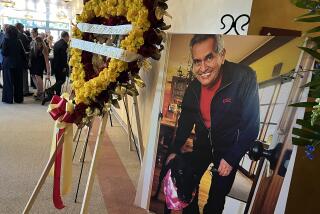Comer Cottrell dies at 82; made Jheri curl available to the masses
Comer Cottrell, an entrepreneur and philanthropist who turned a small Los Angeles operation into a multimillion-dollar success story by catering to the hair care needs of African Americans, died Friday at his home in Plano, Texas. He was 82.
His death from natural causes was confirmed by his son-in-law, Eric Brown.
With $600 and a broken typewriter, Cottrell opened Pro-Line Corp. in downtown Los Angeles in 1970. It was not the first black hair care company but it became one of the largest with the Curly Kit, an at-home hair relaxer that made the loose, gleaming Jheri curl — a style popularized by celebrities such as Lionel Ritchie and Michael Jackson — available at a fraction of the salon price.
“That’s when his company went from $1 million to $10 million in sales,” said Lori L. Tharps, co-author of “Hair Story: Untangling the Roots of Black Hair in America,” published in 2001. Through his company, Tharps said, Cottrell “democratized the Jheri curl.”
With his brother, James, Cottrell turned Pro-Line into one of the most successful black-owned companies in the United States, worth $80 million when they sold it three decades later.
Cottrell headed the Los Angeles Black Businessman’s Assn., which represented about 40 black-owned businesses, and during the late 1970s helped them expand through federal contracts and other opportunities.
After moving to Dallas in 1980, he became the first African American admitted to the powerful Dallas Citizens Council and forged political connections that helped pave the way for the election of the city’s first black mayor, Ron Kirk, in 1995.
In 1989, he became the first African American to own a stake in a major league baseball team when he joined fellow Republican George W. Bush and other investors in purchasing the Texas Rangers.
He used his position to press for more minority involvement in professional sports management. He also plowed some of his wealth into expanding educational opportunities in black communities, including spending $3 million to preserve the Dallas campus of a bankrupt historically black college as the new home of Paul Quinn College, an institution affiliated with the African Methodist Episcopal Church.
Born in Mobile, Ala., on Dec. 7, 1931, Cottrell acquired a passion for business when he accompanied his insurance salesman father on visits with prospective clients.
“I’d see him give them a piece of paper and promise to pay them something when they died, and then he’d walk away with their cash. It fascinated me,” Cottrell recalled in Forbes magazine in 1981.
By the age of 9, Cottrell was eager to make his own money and went into business with his brother selling rabbit furs and meat.
He briefly attended the University of Detroit as a pre-med major but left to join the Air Force during the Korean War.
While managing an Air Force PX on Okinawa, he discovered that the military did not stock the grooming products requested by black servicemen. “Twenty percent of the people on the base were black,” he recalled in Nation’s Business in 1988. “I talked to the authorities, and they told me there was no need for such products.”
After completing his military duty, he settled in Los Angeles and held a variety of sales jobs. He was a sales manager for Sears in 1969, when a friend convinced him to start his own business in the underserved black hair aids market.
He found a rundown warehouse, promising to upgrade the facility in return for a six-month reprieve on rent. He also saved on manufacturing costs by getting local chemical companies to develop Pro-Line’s products in their labs if he bought the raw materials from them.
Cottrell advertised Pro-Line as “A Black Manufacturer That Understands the Hair Care Needs of Black Consumers.” But being a black businessman brought challenges. When he issued a company check, for instance, “People I was dealing with would call the bank and sometimes I had to see the manager” to prove he was legitimate, he told the Los Angeles Times in 1985.
Pro-Line’s first product was an oil-based spray used to enhance the popular Afro hairstyle. A detangler and a spray that held hair in place came next. Military bases accounted for much of the company’s initial business, but sales eventually spread to barbershops, beauty parlors and drugstores. The Cottrells opened plants in Gardena and later in Carson.
In 1980, the company began marketing Curly Kit, the first do-it-yourself product for producing the loose waves favored by many top black celebrities. At about $8 a box, it was a huge savings over the $200 to $300 charged by salons. Pro-Line also sold a similar product for children called Kiddie Kit.
“You couldn’t find a black person in America in their 30s or 40s who didn’t have a Curly Kit or Kiddie Kit at some time in their childhood or adulthood,” said Tharps, the hair historian. “Everybody had a story — about a Curly Kit gone wrong or an addiction to Curly Kit. Comer and his company made this very elite style something the masses could have.”
As Curly Kit took off, Cottrell moved the company to Dallas to lower operating costs and be closer to Pro-Line’s largest market. Soon he was licensing Pro-Line products in Nigeria, Kenya, Trinidad, even Taiwan.
Cottrell retired after Pro-Line became a division of Alberto-Culver in 2000. Married four times, he is survived by his wife, Felisha Starks Cottrell; his brother, James; a daughter, Renee Cottrell-Brown; sons Comer, Aaron, Bryce and Lance; nine grandchildren and one great-grandchild.
elaine.woo@latimes.com
Twitter: @ewooLATimes
More to Read
Start your day right
Sign up for Essential California for the L.A. Times biggest news, features and recommendations in your inbox six days a week.
You may occasionally receive promotional content from the Los Angeles Times.







